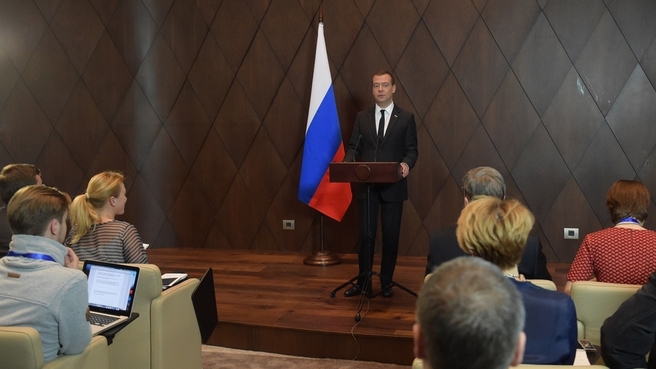Transcript:
Dmitry Medvedev: Ladies and gentlemen, we have planned certain events here, but it so happened that the timeframe of my visit to Azerbaijan changed and during the past two days, I managed to make two visits, one to Armenia and the other to Azerbaijan. In both cases, important talks took place with these countries’ leaders, presidents and prime ministers. Naturally, we also addressed bilateral ties, our economies, new joint projects and things that need to be done today, especially considering that our trade turnover is falling somewhat.
I will make no secret of the fact that initially, the central issue was the escalation of the Nagorno-Karabakh conflict, and, of course, we discussed it among our top priorities.
The most important thing that I realised, at any rate, at present, is that both countries, the leaders of both countries, are determined to honour the ceasefire agreement to the best of their ability, to do their utmost to settle the existing differences, the conflict and all the sad consequences of what happened quite recently, at the negotiating table. I hope that they will adhere to these approaches in the future as well.
Question: You said the main purpose of your visit to Armenia and Azerbaijan was the resolution of the Nagorno-Karabakh conflict and you saw the sides’ readiness to observe the ceasefire. However, did you see their readiness for compromise, concessions and, perhaps, guarantees that fighting will not resume? Thank you.
Dmitry Medvedev: Thank you. You know, I’d like to mention something that I did not hear, which I believe is extremely important. During my conversations with my colleagues both in Armenia and in Azerbaijan, I heard neither the presidents nor the prime ministers state that military escalation is the only way to resolve the conflict.
On the contrary, all of them said that the resolution of this extremely complicated conflict lies in negotiations and that there is no alternative to the ceasefire and turning the ceasefire into a lasting peace. This is by far the most important thing.
Question: During your visits to Yerevan and Baku, did you put forward any proposals regarding the settlement? When do you think talks could begin, and where? Is Moscow ready to become a venue? And do you think Nagorno-Karabakh’s participation in political talks is possible? Thank you.
Dmitry Medvedev: Thank you. You know, if this conflict had broken out several days ago, it would probably be difficult to answer these questions. Unfortunately, however, the conflict has dragged on since 1991. There are mechanisms, formats, proposals and a group that has been working on a settlement. I believe that the most important thing now is that everything that we have achieved during recent years – I personally have been involved in this, the countries’ presidents and foreign ministers are still involved in this – the most important thing is to utilise all these mechanisms to the maximum degree possible. Everything is in place: procedures and groups, and they meet regularly. Unfortunately, as we can see, this is not a guarantee against this kind of aggravation or the dramatic events that took place recently. Nevertheless, it would be even more dangerous to create something new now, as we would thus paralyse this work. I believe it is essential to calm down and return to the negotiating table that has been put in place over the past 20 years.
Regarding Russia’s role, it is obvious, as we are participants in the Minsk Group and co-chairs, and we have never shirked our responsibility. As soon as all of this happened, the Russian President called President Aliyev and President Sargsyan, stating our position and urging the sides to calm down, return to the negotiating table, start consultations and declare a ceasefire.
Naturally, these efforts should continue. Yesterday, Russian Foreign Minister Lavrov visited Baku. Yesterday, I had talks in Armenia and today in Azerbaijan. So, far from evading our share of responsibility for ensuring the continuous settlement process, we are closely involved in it.
Question: Mr Medvedev, you said you discussed Russia-Azerbaijan cooperation in various economic areas during your meeting with President Aliyev. What specific projects did you discuss, for example, in the energy sector?
Dmitry Medvedev: Both Russia and Azerbaijan are major energy producers and players. This constitutes our strength, and frankly, also poses certain problems that plague the Russian and Azerbaijani economy. We have been working on a number of energy projects for a long time now, including the Shah Deniz gas field, a new project with the participation of Rosneft and SOCAR. We also have other projects in mind related to cooperation in the power engineering sector, the existence of the so-called parallel systems.
There are other energy- and infrastructure-related projects, as well. Today, President Aliyev and I discussed one such infrastructure project, namely, building a railway in Iran. This is a major and a fairly complex project, but if it gets implemented, it will give a major boost to our respective economies.
There are other areas of cooperation, which I am particularly pleased to announce. For example, we cooperate with Azerbaijan in an important industry, such as pharmaceuticals, through high-tech projects, which involve Russian pharmaceutical companies that are willing to build production plants in Azerbaijan. We will thus be able to implement our technological advances, and the Azerbaijani market will receive high-quality medications, which local customers will be able to purchase with their national currency, not foreign currency, which they need to buy foreign-made pharmaceutical products. I believe that such projects and high-tech cooperation hold the future.













